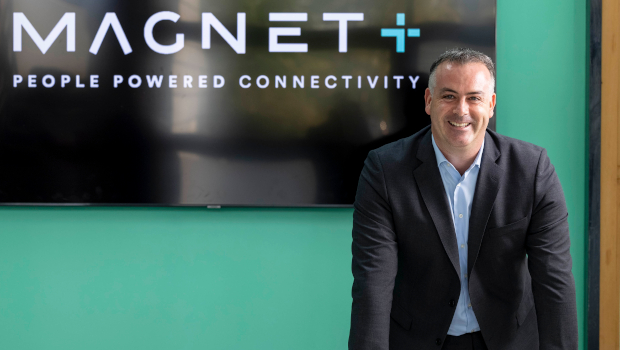
Hybrid working has exposed the shortcomings of traditional business telephone systems and poses the question – what next?
In association with Magnet+
Dumping the landline and moving your telephone system to the cloud will not only save you an average of 45% on telephony costs, it will also uncover rich analytics and insights that will help protect customer service levels and drive overall business performance
The pandemic has forever changed the way businesses and their teams think about work. As work-from-home arrangements extended far beyond what anyone first anticipated, companies have needed to grapple with how they make hybrid working a reality.
Management teams have had to identify real solutions to support their staff, their customers, and the overall health of their businesses through a range of challenges such as balancing work and family commitments in the home environment, protecting customer service levels and responsiveness, maintaining and improving overall business performance and minimising the impact of disruption on the company’s economic health.
All of these challenges can be tackled more effectively when communication among every part of the enterprise and its stakeholders is working well. And at the core of this communication is telephony – the basic glue of incoming and outgoing calls that keep an entire operation moving. Not surprisingly, the pandemic has meant companies have had to urgently re-assess their business telephony requirements to determine whether it’s pulling its weight, or, as is mostly the case, showing its age.
Historically, landlines have underpinned most business telephony systems, typically provided by ISDN and routed through an on-premises switchboard. A main number landline even acted as a kind of signal to customers about a company’s professionalism. Customers, suppliers and staff took comfort from dealing with a business that had a central office, a receptionist, dedicated staff extensions, and reliable voicemail and call menu services. The office was the focus of everything, and desk phones sitting on physical desktops were what connected teams to the calls the business relied on.
The pandemic, however, has changed everything. The rapid switch to homeworking meant, in many cases, that mobile phones became the main means of communications. But as remote working has gained semi-permanent status, companies are keen to explore how they can better control their business telephony, while still facilitating dispersed working.
A new facility called ‘hosted voice’ is now being utilised by many businesses. This system works by eliminating standard phone lines and on-site hardware and moving a company’s phone system to the cloud. Calls are carried over the Internet, with landline-like voice quality, and can be routed to recipients anywhere. Instead of phones sitting on desks in the office, extensions are software-based. Employees simply install an app on their laptop or mobile phone and this facilitates incoming and outgoing calls which ring wherever the app is located.
Hosted voice also offers reduced call rates compared to landlines and a fixed price per user, resulting in an average 45% saving when compared to traditional phone lines. However, the elegance of hosted voice isn’t just that calls are cheaper – it’s that team members can be located anywhere and still present the professional image of traditional business telephony. Extension numbers work just as they always have, and advanced features like call recording and interactive call menus are all included. Easy scaling also makes hosted voice suitable for companies of any size, from single offices to worldwide networks of branches, while adding new users and extensions is quick and easy.
Desk-based
Naturally there will be some team members who are more accustomed to a desk telephone and will miss the tangible nature of a physical handset. In that case employees can be supplied with a physical handset. A so-called ‘hard phone’ looks and feels like a desk phone, with a receiver that is lifted off a base like a traditional phone, but calls are routed through the hosted telephony infrastructure. Companies can ease the transition for team members by determining in advance who will need the physicality of a dedicated handset before making the switch.
Hosted voice also has a big role to play in helping a business protect their customer service levels and responsiveness. This is done through the provision of a range of analytics relating to current and past calls, including how long before calls were answered, who answered and, importantly, the tracking of unanswered calls. Call recordings can also be made for all traffic or individual calls, and past recordings are searchable to let managers pinpoint conversations of interest. This lets companies measure a customer’s calling experience and find areas for improvement.
It’s therefore not surprising that hosted voice is widely utilised by contact and call centres as they strive to compete in an age of rising customer expectations, agent shortages and new compliance requirements. With key features including CRM integrations, real-time visuals on Key Performance Indicators, searchable call recordings and support for work-from-home shifts, it’s a natural choice for this sector.
Hosted voice can also be combined with more than 200 integrations, such as Microsoft Teams, Salesforce and Microsoft Dynamics and some, including our offering Magnet Talk, duplicate activity across two sites to ensure continuity of telephone services even in the event of Internet connection failure.
Companies are taking practical steps to minimise the impact of pandemic disruption on their operations, staff and customers, which has brought their business telephony under the spotlight. As a result, there’s a growing realisation that hosted voice, particularly its rich analytics and insights, can equip a modern business to cope with increasing customer demands – essential at a time when the bar for the customer experience continues to rise. By helping managers spot areas for performance improvement and cost control, hosted voice is poised to become a vital part of the toolset for any company committed to ensuring that its technology serves its business needs, now and in the future.
John Delves is MD of Magnet+








Subscribers 0
Fans 0
Followers 0
Followers